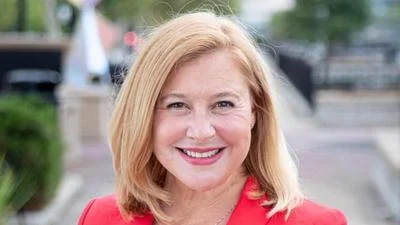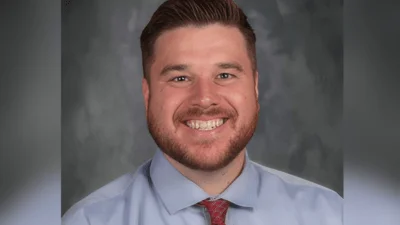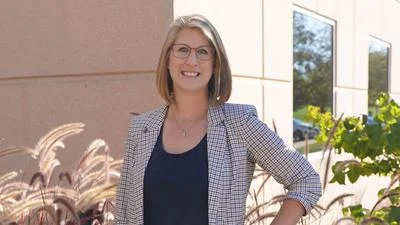Anna Moeller, Illinois State Representative for 43rd District | https://www.facebook.com/annamoellerforstaterep
Anna Moeller, Illinois State Representative for 43rd District | https://www.facebook.com/annamoellerforstaterep
According to the Illinois General Assembly site, the legislature summarized the bill's official text as follows: "Amends the Nurse Practice Act. Provides that a certified nurse midwife with full practice authority may enter into a written collaborative agreement with an advanced practice registered nurse. Provides that an advanced practice registered nurse certified as a nurse midwife may enter into a written collaborative agreement with an advanced practice registered nurse with full practice authority who is certified as a nurse midwife or a physician. Provides that, for an advanced practice registered nurse certified as a nurse midwife, the clinical experience shall be in collaboration with a certified nurse midwife with full practice authority. Makes conforming changes in provisions concerning written collaborative agreements, prescriptive authority under a written collaborative agreement, and full practice authority."
The following is our breakdown, based on the actual bill text, and may include interpretation to clarify its provisions.
In essence, this bill amends the Nurse Practice Act to enhance access to out-of-hospital birth services and address Illinois' maternal health crisis. It allows certified nurse midwives to provide these services without a written collaborative agreement in licensed birth centers if granted privileges by the clinical director. Additionally, nurse midwives can offer out-of-hospital birth services in certain underserved areas under a collaborative agreement with a nurse possessing full practice authority. Physicians are not liable for acts of advance practice registered nurses based solely on collaborative agreements unless there is evidence of incompetence or misconduct. The bill also clarifies terms and establishes conditions for practice and collaboration among registered nurses, advanced practice registered nurses, and physicians in Illinois, with certain sections effective until January 1, 2028.
Anna Moeller has proposed another seven bills since the beginning of the 104th session.
Moeller graduated from Northern Illinois University in 1995 with a BA.
Anna Moeller is currently serving in the Illinois State House, representing the state's 43rd House District. She replaced previous state representative Keith Farnham in 2014.
Bills in Illinois follow a multi-step legislative process, beginning with introduction in either the House or Senate, followed by committee review, floor debates, and votes in both chambers before reaching the governor for approval or veto. The General Assembly operates on a biennial schedule, and while typically thousands of bills are introduced each session, only a fraction successfully pass through the process to become law.
You can read more about bills and other measures here.
| Bill Number | Date Introduced | Short Description |
|---|---|---|
| HB2688 | 02/04/2025 | Amends the Nurse Practice Act. Provides that a certified nurse midwife with full practice authority may enter into a written collaborative agreement with an advanced practice registered nurse. Provides that an advanced practice registered nurse certified as a nurse midwife may enter into a written collaborative agreement with an advanced practice registered nurse with full practice authority who is certified as a nurse midwife or a physician. Provides that, for an advanced practice registered nurse certified as a nurse midwife, the clinical experience shall be in collaboration with a certified nurse midwife with full practice authority. Makes conforming changes in provisions concerning written collaborative agreements, prescriptive authority under a written collaborative agreement, and full practice authority. |
| HB2560 | 02/04/2025 | Amends the Medical Assistance Article of the Illinois Public Aid Code. Provides that upon application to the Department of Healthcare and Family Services, supportive living program settings may convert non-dementia care setting units to dementia care setting units. Provides that all conversions must be operational within one year of approval and meet criteria specific to certification for dementia care setting units outlined in the Illinois Administrative Code. |
| HB2508 | 02/03/2025 | Amends the Medical Assistance Article of the Illinois Public Aid Code. Provides that subject to federal approval, for dates of service on and after January 1, 2026, the Department of Healthcare and Family Services shall reimburse diagnostic testing facilities that provide long-term ambulatory electrocardiogram monitoring services at a rate not less than 80% of the Medicare Physician Fee Schedule rate for such services. Defines "long-term ambulatory electrocardiogram monitoring services". |
| HB2372 | 01/31/2025 | Amends the Tax Increment Allocation Redevelopment Act of the Illinois Municipal Code. Extends the estimated date of completion of a redevelopment project and the retirement of obligations issued to finance redevelopment project costs for an ordinance adopted April 10, 2002 by the City of Elgin. |
| HB2341 | 01/30/2025 | Appropriates $10,000,000 from the General Revenue Fund to the Department of Public Health for local health protection grants for health protection programs. Effective July 1, 2025. |
| HB1910 | 01/29/2025 | Amends the Illinois Local Library Act. Provides that all libraries open to the general public in the State shall maintain a supply of opioid antagonists in an accessible location. Provides that any authorized personnel may administer an opioid antagonist to any person whom the authorized personnel believes, in good faith, to be having an opioid overdose (i) on library grounds; (ii) in the immediate vicinity of the library; or (iii) at a library-sponsored event. Requires libraries to ensure that during all operating hours, there is at least one person present in the library who has completed training in how to recognize and respond to an opioid overdose, including the administration of an opioid antagonist. Requires the Director of the Department of Public Health to identify organizations qualified to offer the training. Provides that the health department of any county where a Library is located may provide, either directly or through providing necessary funds, a supply of opioid antagonists to the library. Allows the Department to adopt rules to implement the provisions. Makes conforming changes in the Pharmacy Practice Act. |
| HB1785 | 01/27/2025 | Amends the Medical Assistance Article of the Illinois Public Aid Code. In provisions concerning PDPM STRIVE staffing ratio calculations for nursing facilities, provides that beginning January 1, 2025, the staffing percentage used in the calculation of the per diem staffing add-on shall be its PDPM STRIVE Staffing Ratio which equals: its Reported Total Nurse Staffing Hours Per Resident Per Day as published in the most recent federal staffing report (the Provider Information file), divided by the facility's PDPM STRIVE Staffing Target. Provides that each facility's PDPM STRIVE Staffing Target is equal to .76 times the facility's Illinois Adjusted Facility Case-Mix Hours Per Resident Per Day. Provides that a facility's Illinois Adjusted Facility Case-Mix Hours Per Resident Per Day is equal to its Nursing Case-Mix (as published in the most recent federal Provider Information file) divided by 1.4627 times 3.79 (which is the Reported Total Nurse Staffing Hours Per Resident Per Day for the Nation as reported in the January 2024 State US Averages file). Effective July 1, 2025. |
| HB1587 | 01/22/2025 | Amends the Nursing Home Care Act and the Specialized Mental Health Rehabilitation Act of 2013. Provides that residents of nursing home facilities have the right to outdoor access. Provides that residents of nursing home facilities and consumers served by mental health rehabilitation facilities shall be free to enter and leave the facilities as they choose. Provides that a facility may suspend this right only if the resident's or consumer's physician examines the resident or consumer and determines that leaving the facility would pose a danger to other residents or consumers or an immediate and substantial danger to the resident's or consumer's safety and well-being, which shall be explained to the resident or consumer and documented in the resident's or consumer's medical chart. |






 Alerts Sign-up
Alerts Sign-up